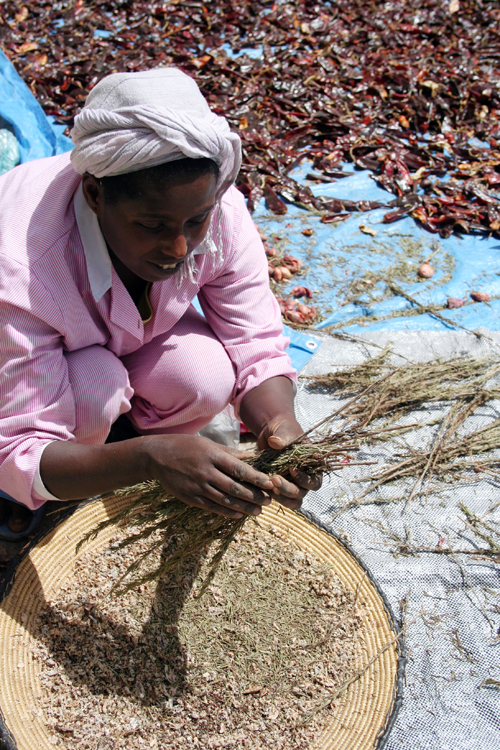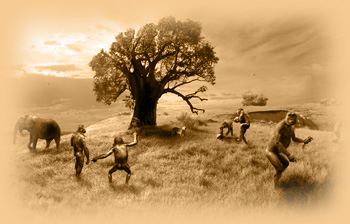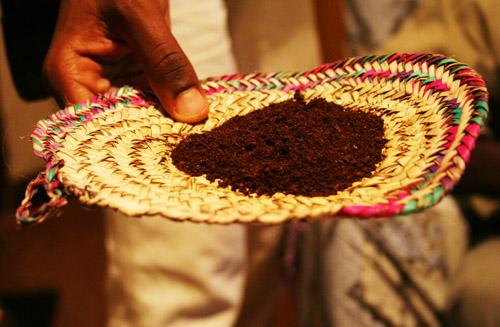After five long days of traveling throughout southern Ethiopia and Northern Kenya, the CLP group and I arrived in Nairobi. It was a bitter-sweet transition. On the one hand, it’s such a relief to arrive in such a vibrant city and country. Nairobi is lined with green trees and flowers juxtaposed to its glass skyscrapers, small shops and restaurants. Despite the excitement of finally reporting in Kenya, there are so many things I’m sure I’ll miss about Ethiopia, many which I might not fully realize except in retrospect. Thus, I’ve compiled a “top five” list of reasons to fall in love with Ethiopia:
1. Coffee
During our first few weeks in Ethiopia, Ernest and I were invited to a coffee ceremony with our friend Zuray’s family. They live on the outskirts of Addis, in a small quiet compound surrounded by green coffee groves and jacaranda trees. We were sitting down, watching Ethiopian TV (ETV) and looking through photo albums. Zuray’s sister arrived with a plate of green coffee beans, just picked off of the trees and smelling of a slightly unrecognizable, fresh fragrance. In a small clay pot she roasted the beans, the awakening rich smell of coffee saturating the air. Minty grass spread in a circle on the floor. In the center – a tray full of small white macchiatto cups. The freshest cup of coffee ever tasted. For those who know me, you can imagine how amazing this was for me – coffee possibly being my biggest weakness.
Ethiopia is the land for coffee lovers. In fact, the country is considered the “birthplace of coffee”, where according to legend, a goat herder named Kaldi discovered that his goats were chewing on mysterious berries and dancing with reckless abandon. Kaldi then informed the local monks who then began making drinks with the berries and discovered that it kept them awake at night. Ever so slowly knowledge of the energizing effects of the berries began to spread. Now coffee is found in local coffee shops like Donkey in my town of Athens, Starbucks across the world and traditional coffee ceremonies in homes across Ethiopia.
2. Dance
Let these amazing shoulders speak for themselves:
3. Food:
I will share with you an embarrassing secret – the first time I tried injera in D.C. four years ago, I thought that the flat, sponge-like bread was a napkin. Soon I saw people eating the napkin, savoring every bite of the seemingly inedible substance as if it were an addictive drug. It was dumbfounding. Even after I tried it, I was still surprised by its sour, strange taste. I’m not a picky eater in the least bit. I have tried fried bugs in Thailand, chicken feet soup in Bolivia. But Inera, which is crepe that is made from tef, a sour-wheat-like grain that is mixed with water yeast and then fermented, has a taste that never leaves you. In Ethiopia, people are so crazy about injera that they will eat injera with injera on injera. They will scramble injera in a dish called firfir, and then scoop it up and eat it with more injera. I have not met one Ethiopian person who did not love the stuff.
The injera and the spices eventually began to grow on me. But it was the familiar, delicious Italian influence, as well as the abundance of organic produce, that made my group’s taste buds water. The fascist Italian regime occupied Ethiopia during WWII – the only European occupation Ethiopia had ever encountered. The fascists fortunately fizzled, and while the country was happy to purge the militant control, it was blessed by the lasting presence of Italy’s taggliatelli, homemade ravioli, marinera sauce, romano cheese and endless cups of cafe macchiato.
4. The Compound:
When living abroad on a small budget, the living situation cannot be perfect. In our case, rent was rather expensive, water was frequently missing, cockroaches invaded the fridge and fleas infested the coaches. Despite all that, the place was rather quaint, located in a great part of town, and was accompanied by a family and group of amazing people.
We spent a lot of time with our landlord’s kids – 10-year-old OB (top right), who was extraordinarily intelligent and acted as our interpreter in the house, and 8-year-old Phillman, (bottom left) who asked to be our bodyguard and claimed to be from the future. The kids also had a puppy named Suki. I’ve never had a dog before, it was really fun to have Suki around – even though she piddled in our house every time she saw us.
Here are poems OB and Phillman gave us before we left:
“Julia – standing on the tree like a bumblebee. She is looking at the stars like an angel from afar.” – OB
“Dear Julia,
She is very sad and she is very sweet and sweet.
Her office looks like a tree and is shaped like a Veee!!
– Your friend, Phillman of the Future.

I also grew close to Tanene, a woman who worked around the compound making spices, injera and bread from scratch. She didn’t speak any English but we’d still find things to joke about as I struggled with my broken Amharic. We’d stand in the kitchen and make Chai. She’d braid my hair in the afternoon.
To say the least, it was hard to say goodbye to the people and the compound.
5. Lucy:
Ethiopia is one of the few African countries to escape colonialism, and is one of the oldest civilizations, dating back at least 2,000 years. In fact, Ethiopia is renowned for being named the “birthplace of civilization” after a team of anthropologists discovered the remains of the world’s oldest human ancestor, who was predicted to have lived approximately 3.2 million years ago.
 Technically, she was known as AL-288. But during the celebration of her discovery, the one of my favorite Beatles’ songs, the acid-inspired “Lucy in the Sky With Diamonds” was played over and over. The name just stuck, and her discovery continues to influence our understanding of evolution to this day.
Technically, she was known as AL-288. But during the celebration of her discovery, the one of my favorite Beatles’ songs, the acid-inspired “Lucy in the Sky With Diamonds” was played over and over. The name just stuck, and her discovery continues to influence our understanding of evolution to this day.
Also, check out the recently published Ethiopian Fact Sheet on the Common Language Project Web site.



